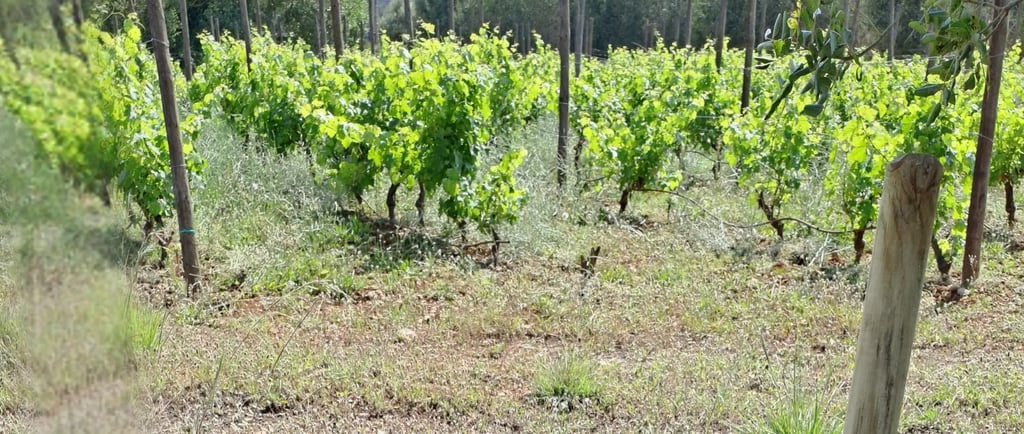The Sadness of a Vineyard in a State of Neglect
5/20/20253 min read


Abandoned Vineyard: The Reality of a Forgotten Estate
Vineyards have historically been more than just crops; they represent the soul of many regions, their culture, economy, and tradition. This estate, once a symbol of prosperity and family ties, now presents a very different landscape: rows of withered vines, overgrown weeds, and decaying structures. The abandonment of this vineyard not only reveals a material loss, but also a wound in the cultural and productive fabric that once gave life to this land.
Located in an area with privileged climatic and soil conditions, this vineyard once had enormous potential. The gentle slopes, sunny orientation, and microclimate of the region created an ideal environment for the production of quality grapes. However, the passage of time, lack of resources, and changes in economic dynamics have led to the progressive neglect of the land. Today, what was once an emblem of local pride is in a worrying state of disrepair.
A Vineyard with History and Wounds
The estate occupies several hectares, and its varied terrain gave it natural advantages for viticulture. Years ago, the vines stood vigorously, laden with fruit. Today, many show signs of water stress, fungal diseases, and pest damage, direct consequences of lack of maintenance. Neglect has created an unfavorable environment, even for local biodiversity, also affecting the native species that coexisted with the crop.
The transformation of the environment is also reflected in the community. Where entire families once gathered during the harvest, silence now reigns. Stories told by former workers speak of hard but meaningful days, where each harvest was a celebration, a shared tradition that united generations.
Impact of Neglect and Weed Growth
One of the most evident signs of deterioration is the presence of invasive weeds. These plants compete with the vines for water and nutrients in the soil, further aggravating the condition of the vines. Furthermore, weed roots intertwine with those of the vines, hindering their recovery. The density of the vegetation also impedes basic tasks such as pruning, phytosanitary control, and harvesting.
This biological disorder creates a vicious cycle: the greater the neglect, the more difficult it is to intervene. Meanwhile, fungi proliferate in the stagnant moisture, further weakening the vineyard. Without intervention, biodiversity loss and soil erosion become inevitable.
A Legacy That Can Still Be Rescued
Despite the bleak outlook, the estate still holds an opportunity. Many successful projects have demonstrated that it is possible to rescue abandoned vineyards through a sustainable, technical, and humane approach. The reintroduction of resistant varieties, the application of regenerative agriculture, and the gradual clearing of the land could mark the beginning of its recovery.
Involving the local community, forming alliances with agronomist experts, and promoting wine tourism initiatives or agricultural cooperatives are viable avenues. The key is to restore the vineyard's social and productive function, rooting it once again in the region's identity.
Looking to the Future
This estate not only represents a neglected vineyard, but the living memory of a vibrant past that can still be revived. The stories of those who worked it, the ancestral techniques still remembered, and the natural value of the land are resources as valuable as the land itself.
With planning, investment, and collective will, the vineyard can flourish again. It won't be an immediate process, but it will be a profoundly transformative one: for the estate, for its surroundings, and for those who believe in the possibility of bringing life back to the land that once nourished an entire community.
Technical and Community Activity Area
Service Technique
Our activity focuses on providing specialized services for the maintenance, restoration, and improvement of vineyards in Mallorca, with a comprehensive approach based on ecological, regenerative, and sustainable techniques. The main technical aspects of the service include:
Agronomic assessment and diagnosis of the vineyard, identifying deficiencies, diseases, soil structural problems, or errors in previous management.
Training, maintenance, and rejuvenation pruning, respecting the plant's natural cycles and promoting its longevity.
Recovery of abandoned or damaged vines using agroecological techniques, ground cover, soil regeneration, and biological pest control.
Sustainable soil cultivation: minimal or no tillage, incorporation of compost and natural biofertilizers to restore soil fertility without the use of synthetic chemicals.
Efficient water management: installation of irrigation systems
We offer ecological services for vineyards, wineries, farms, and rural hotels. We provide ecological and sustainable services in Mallorca.
Privacy Policy
© 2025. All rights reserved
